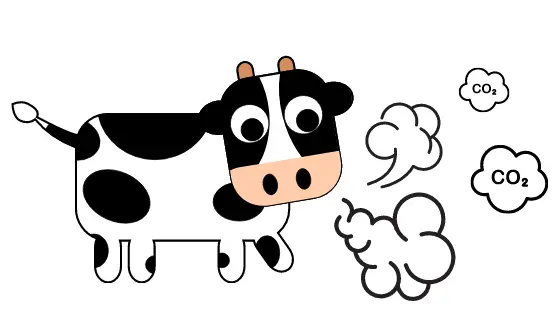Do Animals Burp? Why do animals burp?
Do Animals Burp? Here’s your quick answer
Yes, animals do burp, but not all kinds of animals burp. The animal kingdom is so diverse and it has been majorly seen that most of the higher vertebrate animals ranging from a few amphibians like frogs, toads, etc. to the majority of the mammals like dogs, cats, humans, etc. are known to burp.
The fact that a lot of animals besides humans can burp by exhaling the digestive gases from their mouths. Most effectively burping is quite popular in ruminants like cows, goats, sheep, etc.
Animals do burp and it’s pretty much clear as it has been experimentally proved that they release gas from the upper digestive tract (esophagus and stomach) through the mouth. And, so it produces an audible sound.
Just, for example, burping is well-known in cows. Cows, along with goats, sheep, buffalo, and even camels, are known as ruminant animals, and all of them burp methane gas.
In most of the animals, burping does occur just like the way we humans do burp. But, in some animals like the young kangaroos, cattle, etc. burping can happen accompanied by a little bit of vomiting.
Mammalian babies that include human infants, baby rabbits, etc. during drinking their mother’s milk are often seen burping accompanied by their action of vomiting by expelling out the ingested milk.
So, it’s pretty much clear that animals do burp and burping as many as four times after a meal is pretty much normal for most of the animals. Ruminants like cows do burp very often, by expelling the gases from their stomach.
During some illnesses, the animals that can burp do burp very often indicating acid reflux happening in their stomach. Such cases happen when the acid in the stomach flows back into the esophagus and causes heartburn.

Why do animals burp?
Burping in animals is actually due to expelling out of the unwanted gases like carbon dioxide, hydrogen, nitrogen, etc. that the body doesn’t need and simply wants to get rid of.
Such gases can accumulate in the body due to breathing at the same time when feeding, or due to various respiratory exhalation of the gases when eating food, or maybe when unwanted gases build up in the stomach.
So, probably when the animals feed upon its food, it will also ingest various unwanted gases from the atmosphere like nitrogen, carbon dioxide, etc. and these gases always finds its way outside of the mouth of the animal causing burps.
Also, when the gases build up in the stomach, the extra gas is forced out of the stomach, up through the esophagus, and so finally comes out of the mouth as a burp.
Just for example, in cows, the rumen chamber of the stomach causes the production of methane gas from the forage it had ingested that slowly moves up the esophagus, and comes out as burps.
They can also burp and then vomit in order to take out any indigestible or poisoning thing if it gets inside. This is often seen in frogs and various other reptiles like a few species of snakes that produce inaudible burps and expels out the indigestible part of their ingested food through their mouth.
Many infants like cattles, baby foxes, etc. that feed on mother’s milk, are also known to burp. It’s because they do lack the majority of the proteins that break down the lactose (a natural sugar) in milk and so their gut can’t fully digest the milk. So, fermentation of milk occurs in their gut that produces the extra gas as a burp.
In dogs, it has been often seen that the dogs that swallow their food down will often burp to release the air that has been accidentally swallowed with the food.
It has been seen that when they feed on an alkaline diet they will often produce gas when it meets the stomach acid, resulting in increased burping.
Many animals during the initial stage of digesting any food, it can release the extra gasses formed inside via. the mouth as burps. And, during the mid or final stages of digestion of food, they can release it via. its anus as farts.
So, probably burping is advantageous, as it helps the animals release various gases to save themselves and also to get rid of any disturbance in their digestive system.
What animals can burp?
Ruminants like cows, goats, sheep, buffalo, and even camels can burp methane gas. Methane is a powerful greenhouse gas.
Some of the amphibian species like those of the frogs can burp and expel out any poisonous insect that they have eaten.
This can happen in those instances when any of the insects that a frog has eaten releases toxic chemicals inside their digestive system. And so, this can cause the release of various toxic gasses via. its mouth as burps.
All meat-eating animals like dogs, big cats, wolves, fox, hyenas, etc. do burp. Burping happens in them because the various types of gases are released when digesting the ingested meat in their stomach.
Reptiles like Giant monitor lizard, Bearded dragon, etc. can also burp. They have bacteria in their intestines that produce gas that often come out either as farts or as burps.
Some researchers have also put forward the concept that many of the birds like parrots, hens, etc. burp, because they all have the mechanism to expel gasses out of their stomach.
According to ornithologists, there is no strong evidence that birds can burp, but logically there is nothing that prevents them from burping as they do have the mechanism for burping. But, it’s pretty much sure that the most of them don’t have an audible burp.
The animal kingdom is very diverse with only around 43,000 known species, that make up a very minor proportion of the global total of some 1.7 million species described on the planet earth.
So, mentioning all of the animals’ names that do burp isn’t well possible here in this post. And moreover, due to so much diversity, there are still pieces of evidence lacking to determine which animals do really burp and which don’t.
What are burps made of?
Burps are nothing but the gases that are being expelled out of the animal’s body. Burps can contain gases like nitrogen, oxygen, carbon dioxide, hydrogen, methane, etc. that are to be taken out of the body.
It usually causes those gases that we have swallowed and are needed to be escaped out through one end or the other end of the body. So, they often come out through the mouth end as burps.
When animals eat and ingest food, during the process of digestion and absorption of nutrients from the food, various microbes or bacteria that live in the gut break down anything that’s leftover. And in that process creates gas or gas bubbles that usually escapes as both burps and farts.
Also in the process, after eating certain kinds of foods, for instance, those that contain sulfur, can make the burp of an animal smelly.
Some bacteria can also make Methane (CH3) or Hydrogen sulfide (H2S) that can add a distinctive odor to their burp and fart.
Now, burping often depends on the kind of food the animal is feeding upon. Just for example, in humans, some foods, including beans, tend to cause expiration of gas as burps because our bodies are not well equipped to digest them.
